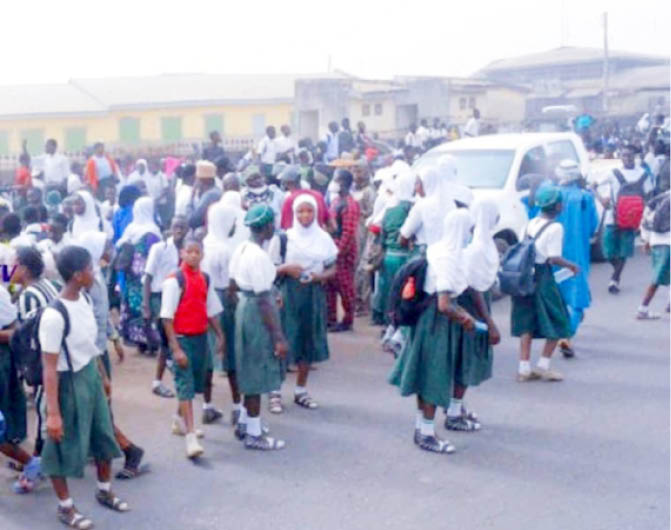An avoidable crisis in Kwara schools
Government and religious leaders are entangled in the argument over the use of the hijab in grant-aided schools that are affiliated to Christian missions in the state

FILE PHTO: Stranded secondary school students
Although the atmosphere is getting calmer, Kwara State has in the past few weeks been at the centre of a boiling religious crisis over the use of hijab by female Muslim students in secondary schools. The present disagreement began when a female Muslim student was asked to remove her hijab during an assembly session in a grant-aided school operated by one of the Christian missions in the state. In a bid to forestall the breakdown of law and order, the state government shut down 10 schools that were at the centre of the controversy.
Government and religious leaders are entangled in the argument over the use of the hijab in grant-aided schools that are affiliated to Christian missions in the state. While Muslims describe the refusal to allow female Muslim students to wear hijab as an infringement on their fundamental human rights, their Christian counterparts argue that such negates their culture as they also claim that government lacks the power to authorize the use of hijab in grant-aided Christian missionary schools.
When the affected schools which were earlier closed down by government re-opened on March 17, 2021, violence ensued after Christian officials of the Baptist School situated in the Surulere area of Ilorin disallowed girls in hijab from entering into the school. This led to a clash where both Christian and Muslims hurled objects at one another. In less than one week after this incident, Muslims and Christians at the Sabo-Oke parish of the Cherubim and Seraphim School in Ilorin again chose to settle their differences over hijab by throwing stones at one another.
The act of parents and religious leaders on both sides of the divide leading or joining their wards in chaos is condemnable in strongest terms. It is unfortunate that religious leaders who should be in the frontline of inculcating religious tolerance in their wards are rather losing their temper and descending so low to express bigotry before young schoolboys and girls over a matter that can be resolved peacefully.
Besides the judgment of the Kwara State High Court of 2016 and that of the Court of Appeal of 2019 on the use of hijab by Muslim schoolgirls, some states in South West Nigeria including Lagos, Osun, Ekiti and Oyo have gone through the same controversy, which various court judgments resolved by allowing interested Muslim schoolgirls to use hijab.
In an advertorial, the Secretary to the Kwara State Government, Professor Mamman Saba Jibril, clarified that since the state took control of many schools in 1974, which ownership hitherto cut across faiths and individuals, Kwara State government has continued to wholly fund, provide staff, manage and control these schools; stressing that being public-owned, the schools were required to adhere to government policies. If the state government has actually taken over such schools, the former missionary proprietors no longer have control over the grant-aided schools and the institutions must be run according to the state’s laws.
Nonetheless, if the missionary organisations prefer to have their schools returned to them in order to determine and regulate dress code in the schools, government could oblige such requests provided basic academic standards would not be compromised.
The repeated controversy over hijab is a reflection of unnecessary consciousness about religion, which only seeks to polarize young Nigerians along religious divides. Religious leaders and parents should abstain from indoctrinating their children with fanatical tendencies. With security being threatened by various forms of criminality in the country, this is not the time to allow religious crisis rear its head.
While we urge the Kwara State government to continue with and remain committed to its peacebuilding efforts among stakeholders, we appeal to the conscience of religious leaders, parents, school proprietors, individuals and organisations to choose the path of dialogue in resolving the matter. Nigerians should give peace a chance.
